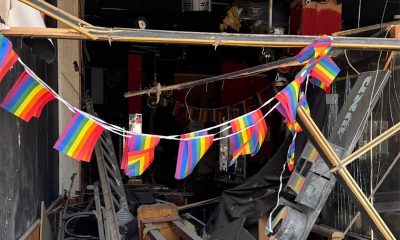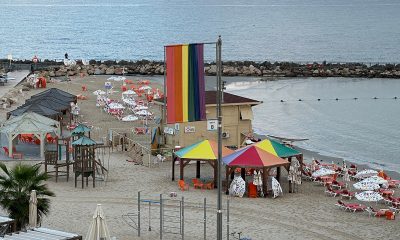Middle East
Gay Palestinian man murdered, decapitated in West Bank
Ahmed Hacham Hamdi Abu Markhieh had sought refuge in Israel
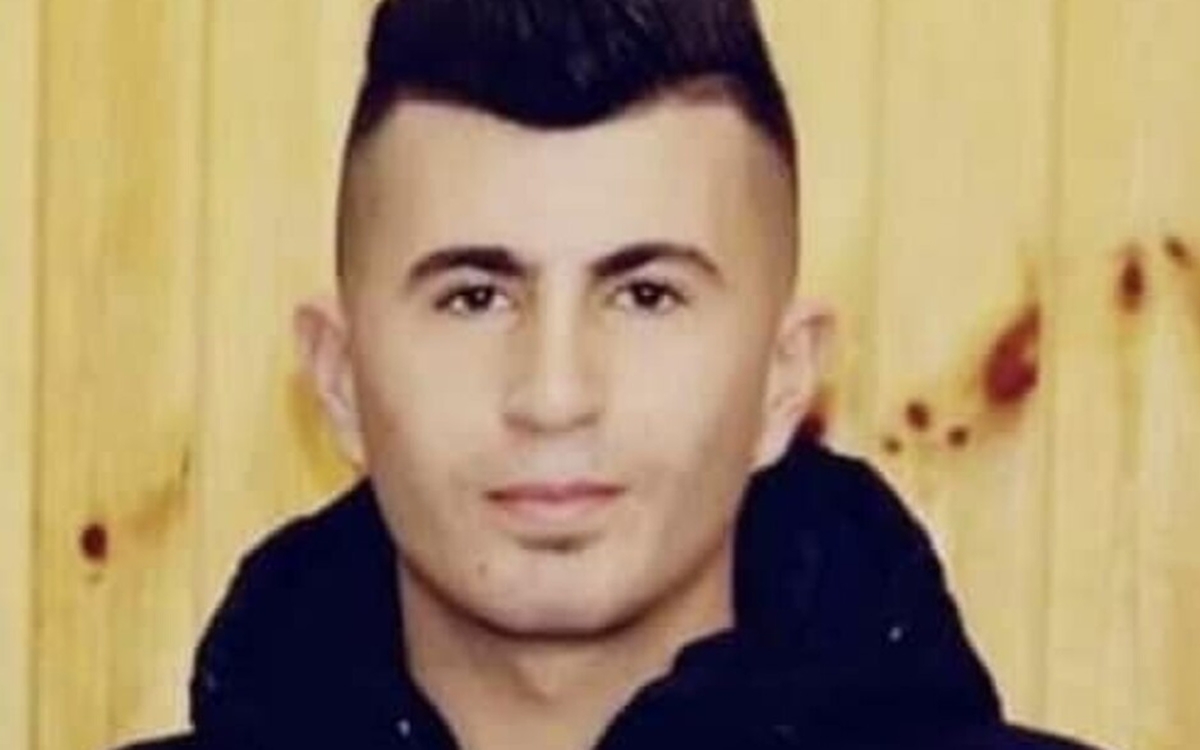
WDG, the Washington Blade’s media partner in Israel, wrote this article.
The decapitated body of Ahmed Hacham Hamdi Abu Markhieh was discovered in Hebron on Oct. 5 with his head cut off and lying beside it.
Marakhia, a 25-year-old Palestinian, has been living in Israel for the past two years. He fled after he was persecuted and received death threats because of his sexual orientation.
Rumors about Markhieh’s death started to circulate after a video on social media showed his body lying on the side of the road. Markhieh’s friends in Israel, who feared for his safety after he did not arrive at work in the morning, immediately linked his disappearance to the video and assumed that the body on the video was Marakhia’s body.
Markhieh’s relatives, who live in the Palestinian Authority, issued a statement that acknowledged their mourning, but did not comment on the circumstances of his death.
“This is a very ugly crime,” one of his relatives told Al Karama, a Palestinian radio station, while asking for the family’s privacy to be respected after “this heinous and unprecedented crime that shocked the homeland.”
U.S. Ambassador to Israel Thomas R. Nides responded to the murder and said he was “shocked and horrified by the murder and beheading of Ahmed Abu Murkia in Hebron.”
“Violence against LGBTQI+ people is unacceptable,” said Nides.
It is not clear how Marakhia traveled from Israel to the Palestinian territories.
His acquaintances in Israel believe he was kidnapped in Israel and brought back to Hebron, where he was murdered. According to them, Marakhia had no reason to return to Hebron by himself, especially because the danger posed to his life. Even his closest friends who helped him in Israel claim that this is the reason for his murder.
“He said that people in his village wanted to kill him,” said his acquaintances in Israel. “He was afraid of his brothers, his uncles, his cousins.”
The Palestinian police who are investigating the case have arrested a suspect in the murder, but they have not classified it as a hate crime. They also have not identified a potential motive for the murder.
“This is a new type of crime that we are not used to in Palestinian society,” said Loay Irzikat, a spokesman for the Palestinian police. “This is a dangerous development and it must be examined and analyzed broadly and deeply in order to understand why the incident developed in this way.”
Issa Amro, a Palestinian human rights activist, has claimed Marakhia’s death has nothing to do with his sexual orientation.
“To Israeli media and Israeli leftists, Ahmed Abu Markhieh was not killed in Hebron because he was gay”, Amro tweeted, “No one in Hebron knew that he was gay, and the killer was his close friend, who lost his brain because of drugs, so please be accurate about it.”
Markhieh planned to move to Canada
While in Israel, Ahmed was active in the community and participated in an Arab LGBTQ group in the south. The many friends who knew him from volunteering describing a sensitive, brave and optimistic man who did everything he could to start a new life in Canada.
In order to promote his immigration application, Ahmed was assisted by Al Bait Al Mokhtalef (The Different House), a group that assists Palestinian LGBTQ and women in submitting asylum applications abroad.
“LGBTQ and Palestinian women who fled Palestinian Authority territories in danger for their lives due to their sexual orientation or gender identity do not receive any status in Israel and are prevented from submitting an asylum application as asylum seekers from other countries do,” explained Different House CEO Rita Petrenko. “After a long legal battle of human rights organizations, the state specifically opened the process of issuing ‘residence permits for welfare needs’ to LGBTQ people and Palestinian women.
Since this is a different process from the asylum application process, it causes them to lose some of the rights granted to asylum seekers, and deprives them of services intended for other asylum seekers. As of July 2022, Palestinians with residence permits for welfare purposes can receive work permit, which should be a great relief. But this still does not give them stability in life, because their status is not permanent. For most of them, the only solution is to ask the United Nations Commission for assistance in resettlement in a third country.”
The Different House helps those LGBTQ people mainly in dealing with the bureaucracy in the civil administration and getting or renewing a residence permit. The Different House also offers access to shelters, clinics and hospitals.
“We are cooperating with certain Knesset members for the purpose of changing policy. But we do not receive aid from the state for activities on behalf of Palestinian LGBTQs. There is assistance from the Ministry of Social Equality and the Beer Sheva municipality for social activities of Arab LGBTs in the south, in which Palestinians can of course participate,” said Petrenko. “We also collaborating with human rights organizations such as Doctors for Human Rights, the HIAS association, legal clinics, etc.”
Markhieh murdered less than a month before Israel elections
The difficult questions raised by Markhieh’s murder do not remain within the borders of the Palestinian Authority. They have been asked throughout Israel as well.
Media coverage of Markhieh’s murder undermine the sense of security among members of the LGBTQ community in Israel; and the case raises many questions among the members of the community concerning their personal safety. Community members have also demanded that the Israeli government will take care of the safety of those staying within its borders.
Less than a month before the elections in Israel, Markhieh’s shocking murder is even used by the politicians as a tool to confront their political opponents, as far as the LGBTQ issues are concerned.
Right-wing politicians have taken advantage of the opportunity to point out the cruelty of the political partners of the left-wing parties, which include the Arab parties Ra’am and the Joint List, and to emphasize that the aspiration for the establishment of a Palestinian state is the establishment of an ISIS state that executes LGBTQ people. In response, the left-wing activists emphasize that the right-wing parties teamed up with Jewish anti-LGBTQ parties, which are based on an anti-LGBTQ agenda, just to return to power.
There are currently around 100 LGBTQ Palestinians in Israel who received a residence permit to live in the country after fleeing the Palestinian territories due to their sexual orientation. But apart from the possibility of working, they do not receive refugee status that regulates their civil rights, and most of them are in some stage of immigrating to a third country, far from those to seek to do them harm.
The Different House believes that in order to save those Palestinians from Markhieh’s cruel fate, the state must help submit those requests and speed up their processing because these are life and death cases.
“First of all, what the state needs to do is to allow LGBTQ people and Palestinian women to submit asylum applications in the same way as LGBTQ people from other countries, and accordingly to carry out a process of permanent status or resettlement in a third country,” Petrenko says, “Most of the Palestinian LGBTQ people staying in Israel are afraid to stay in Israel, because they are afraid that they could be found here as well. The state can help by granting them asylum seeker status during the waiting period, similar to all other asylum seekers.
For those who are unable to leave for unusual reasons, the state should enable a process similar to the one used in the process of recognizing a refugee and at the end of which permanent status is granted.”
Israel
Activist recalls experience in Tel Aviv after Israel-Iran war began
Marty Rouse was part of Jewish Federations of North America Pride mission

A long-time activist who was in Israel last month when its war with Iran began has returned to D.C.
Marty Rouse traveled to Israel on June 6 with the Jewish Federations of North America. The 5-day mission ended the night before the annual Tel Aviv Pride parade was scheduled to take place.
Mission participants met with Israeli President Isaac Herzog and several LGBTQ activists in Tel Aviv and Jerusalem. They visited the Western Wall, the Nova Music Festival site, and Nir Oz, a kibbutz in southern Israel that is less than a mile from the country’s border with the Gaza Strip. Mission participants also visited Sderot, a city that is roughly a mile from the Hamas-controlled enclave, a veterans rehabilitation facility, a new LGBTQ health center and the Aguda: The Association for LGBTQ Equality in Israel in Tel Aviv.
Hamas militants on Oct. 7, 2023, killed upwards of 360 partygoers and kidnapped dozens more at the music festival that was taking place at a campground near Re’im, a kibbutz that is roughly 10 miles southwest of Nir Oz. The militants killed or took hostage nearly a quarter of Nir Oz’s residents. They also took control of Sderot’s police station.

Tel Aviv Deputy Mayor Chen Arieli spoke at the mission’s closing party that took place at the Sheraton Grand, a hotel that overlooks Tel Aviv’s beachfront, on June 12.
Rouse and other mission participants planned to stay in Tel Aviv for the Pride parade, which was scheduled to take place the following day. He and Gordie Nathan, another mission participant who lives in Palm Springs, Calif., had checked into a nearby hotel that was less expensive.
“We said our farewells,” recalled Rouse when he spoke with the Washington Blade in D.C. on June 24. “We went to our hotels, and we get the warning, and then all hell broke loose.”
Israel early on June 13 launched airstrikes against Iran that targeted the country’s nuclear and military facilities.
Rouse said mission organizers told him and other participants who remained in Tel Aviv to meet at the Sheraton Grand for breakfast and dinner — Israel’s airspace was closed in anticipation of an Iranian counterattack, and authorities cancelled the Pride parade.
He said he went to bomb shelters at least twice a night for three nights.
Israel’s Home Front Command during the war typically issued warnings about 10 minutes ahead of an anticipated Iranian missile attack. Sirens then sounded 90 seconds before an expected strike.
Rouse and Nathan walked to the Sheraton Grand on June 13 when the Home Front Command issued a 10-minute warning. They reached the hotel in a couple of minutes, and staff directed them to the bomb shelter.
“You know to walk slowly, everything’s fine,” recalled Rouse. “You get 10 minutes, so everything was fine when the alarm goes off.”
Rouse described the Sheraton Grand shelter as “well lit” with WiFi, a television, and air conditioning. He was watching an Israeli television station’s live coverage of the Iranian missile attack when he saw one hit an apartment building in the Tel Aviv suburb of Ramat Gan.
A 74-year-old woman died and her boyfriend was seriously injured.
“I go over to look at the TV, just to watch,” recalled Rouse. “All of a sudden, you watch, and you see one bomb go and land and explode in Tel Aviv on TV. It landed and blew up.”
“I was like, okay, this is real, and so that was scary,” he added.
Rouse said the bomb shelter in the hotel where he and Nathan were staying after the mission ended was far less comfortable.
“It was dark. It was humid. It was hot. It was very uncomfortable,” said Rouse. “You really felt alone.”

Rouse and nearly everyone else on the mission who were in Tel Aviv when the war began left Israel on June 15. They boarded buses that took them to the Jordanian capital of Amman, which is a roughly 2 1/2-hour drive from Tel Aviv through the West Bank.
Rouse described the trip as “like a field trip” until they drove across the Jordan River and arrived at the Jordanian border crossing.
“You walk into this room, and instead of being in a well air-conditioned airport, you’re in this hot, humid, small place in the middle of the desert, packed with people, and those big, large, loud fans and pictures of military people on the walls,” he said. “It was almost like a Casablanca kind of feeling.”
Rouse said Jordanian authorities brought mission participants through customs in groups of 10. A Jewish Federations of North America liaison from Amman who previously worked as a tour guide for A Wider Bridge — a group that “advocates for justice, counters LGBTQphobia, and fights antisemitism and other forms of hatred” — went “behind closed doors” to ensure everyone was able to enter the country.
“It took a really long time,” Rouse told the Blade.

Mission participants arrived in Amman a short time later. They checked into their hotel and then had dinner at a restaurant.
“Now we feel like we’re safe and we’re in Amman,” recalled Rouse. “We’re sitting outside having a beautiful dinner.”
Iranian missiles passed over Amman shortly after Rouse and the other mission participants had begun to eat their dessert. They went inside the restaurant, and waited a few minutes before they boarded busses that brought them back to their hotel.
“No one was openly freaking out, which I was surprised by,” said Rouse.
The group was scheduled to fly from Amman to Cairo at 11 p.m. local time (4 p.m. ET) on June 16. They visited Jerash, an ancient city north of Amman, before their flight left Jordan.
“[The Jerash trip] actually took our minds off of everything,” said Rouse.
A Jewish Federations of North America contact met Rouse and the other mission participants at Cairo’s airport once their flight landed. Rouse arrived at JFK Airport in New York on June 17.
Trump-announced ceasefire ended 12-day war
President Donald Trump on June 23 announced a ceasefire that ended the 12-day war.
The U.S. three days earlier launched airstrikes that struck three Iranian nuclear sites. The ceasefire took effect hours after Iran launched missiles at a U.S. military base in Qatar.
Iran said the war killed more than 900 people in the country.
The Associated Press notes Iranian missiles killed 28 people in Israel. One of them destroyed Tel Aviv’s last gay bar on June 16.
The war took place less than two years after Oct. 7.
The Israeli government says Hamas militants on Oct. 7, 2023, killed roughly 1,200 people on that day when it launched its surprise attack on the country. The militants also kidnapped more than 200 people.
The Hamas-controlled Gaza Health Ministry says Israeli forces have killed nearly 55,000 people in the enclave since Oct. 7. Karim Khan, the International Criminal Court’s chief prosecutor, has said Israeli Prime Minister Benjamin Netanyahu and former Hamas leader Yahya Sinwar, who the IDF killed last October, are among those who have committed war crimes and crimes against humanity in Gaza and Israel.

Rouse upon his return to the U.S. said he “was never as aware of the comfort of another human being than I was during that time.” Rouse affectionately called Nathan his “bomb shelter boyfriend” and even questioned the way he reacted to the missile alerts.
“He’s sitting on the edge of the bed and he goes, okay, I’m going to put on my socks and my shoes, and I say, really? You’re going to put on your socks,” Rouse told the Blade. “The fact that I was nervous, that putting on socks might have changed the direction of our lives, to me was like I can’t believe I said that to him.”
Rouse quickly added Nathan helped him remain calm.
“If I was by myself, those nights would have been long enough,” said Rouse. “It’s a totally different feeling to be with another human that you know than to be by yourself.”

Rouse also praised the Jewish Federations of North America.
“JFNA really sprung into action and started to figure out all options to get us all safely home,” said Rouse. “It was all about logistics. Staff worked around the clock identifying and then mobilizing to get us back to the states. It was a great team effort and I know I speak for everyone in expressing our deep appreciation for their dedication to getting us safely home.”
Israel
Iranian missile destroys Tel Aviv’s last gay bar
Mash Central is a few blocks from US Embassy
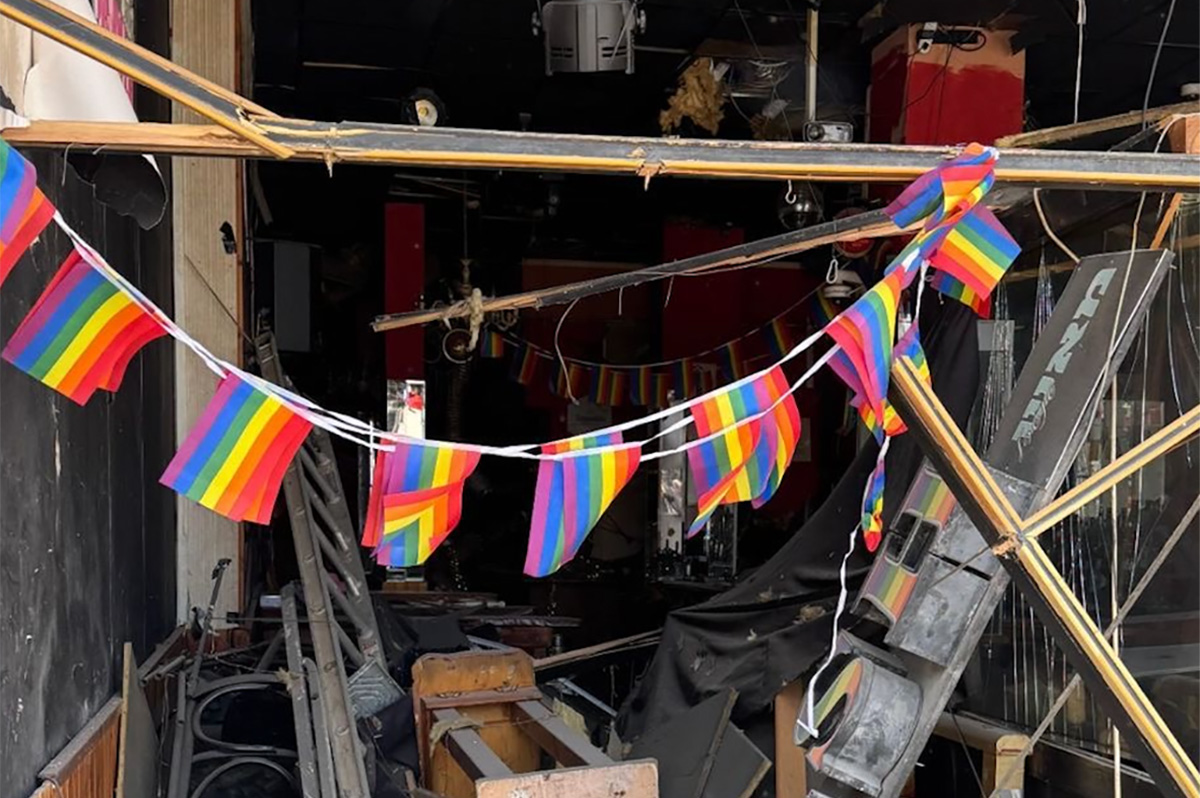
An Iranian missile on June 16 destroyed a gay bar in Tel Aviv, Israel.
The missile struck Mash Central, which is a few blocks from the U.S. Embassy on Allenby Street, and surrounding buildings. Israeli sources confirmed to the Washington Blade that Mash Central was the only gay-specific bar in Tel Aviv.
“Iran’s missile strike yesterday destroyed Tel Aviv’s only dedicated gay bar,” reads one Instagram post with pictures from inside the bar. “This place provided a safe space for minorities to express themselves — now it’s trashed.”
Mash Central describes itself as Tel Aviv’s “last gay bar standing,” even though the city promotes itself as one of the world’s most LGBTQ-friendly cities.
Israel on June 13 launched airstrikes against Iran that targeted the country’s nuclear and military facilities. Iran since the war began has launched hundreds of missiles towards Israel.
Tel Aviv’s Pride parade was scheduled to take place on June 13, but authorities cancelled it. Caitlyn Jenner, who was to have been the event’s guest of honor, is among those who were stranded in Israel after the war began.
Israel
Tel Aviv Pride parade cancelled after Israel attacks Iran
Caitlyn Jenner was to have been guest of honor
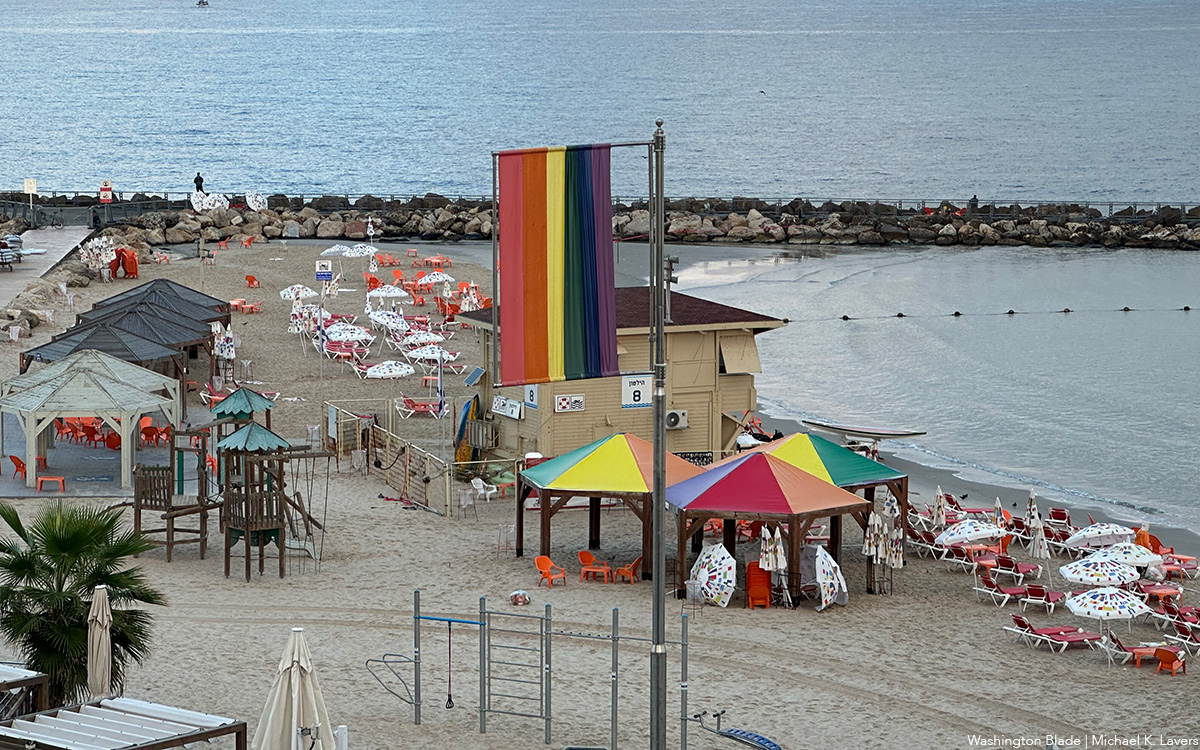
Tel Aviv authorities on Friday cancelled the city’s Pride parade after Israel launched airstrikes against Iran.
The Associated Press notes the Israeli airstrikes targeted nuclear and military facilities in Iran. Reports indicate the airstrikes killed two top nuclear scientists and the leader of Iran’s Revolutionary Guard.
Iran in response to the airstrikes launched more than 100 drones towards Israel. The Israel Defense Forces said it intercepted them.
The Tel Aviv Pride parade had been scheduled to take place on Friday. Caitlyn Jenner was to have been the event’s guest of honor.
Authorities, in consultation with local LGBTQ activists, last year cancelled the Tel Aviv Pride parade out of respect for the hostages who remained in the Gaza Strip after Oct. 7. Jerusalem’s annual Pride parade took place on June 5.



